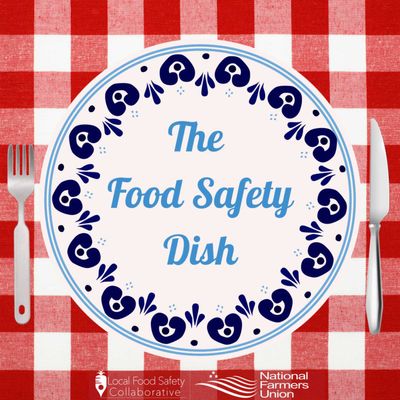News & Updates
FDA Releases Standards Relating to the Agricultural Water Final Rule
FDA recently released standards for the growing, harvesting, packing, and holding of produce for human consumption relating to the Agricultural Water Final Rule issued under the FDA Food Safety Modernization Act (FSMA). The final rule replaces specific pre-harvest agricultural water requirements stated in the 2015 Produce Safety Rule. The update includes requirements for system-based agricultural water assessments to determine and guide suitable measures to minimize potential risks associated with pre-harvest agricultural water. Please access fact sheet and/or flow chart for more information.
Food Safety Podcast
 The Food Safety Dish podcast covers all things food safety, brought to you by National Farmers Union's Local Food Safety Collaborative. They talk with farmer and expert voices on their subject specialties: sharing practical advice, wisdom, and how to incorporate good food safety practices into your own growing operation.
The Food Safety Dish podcast covers all things food safety, brought to you by National Farmers Union's Local Food Safety Collaborative. They talk with farmer and expert voices on their subject specialties: sharing practical advice, wisdom, and how to incorporate good food safety practices into your own growing operation.
For more information: The Food Safety Dish.
North Central Regional Buyers Handbook Press Release and Fact Sheet
Just published! The Produce Safety Handbook for Buyers is an online guide for produce buyers that clarifies the complex landscape of food safety regulations and standards across states. This tool helps buyers navigate each state's produce safety audit and inspection information through an interactive glossary of terms, charts, and tables.
Take the 2025 Produce Questionnaire/survey
This survey renewal is an element of the Department of Agriculture, Trade and Consumer Protection’s (DATCP) annual review to determine how the federal Food Safety Modernization Act (FSMA) Produce Safety Rule (PSR) applies to Wisconsin produce operations. Each farm should verify their information with Safe Wisconsin Produce (SWP) on a regular basis. By completing this survey renewal, you assist DATCP with the following:
- Supporting efficient delivery of inspectional services.
- Your response to this survey renewal serves as pre-verification of your farm’s operational details. Providing your up-to-date information helps to streamline inspection scheduling, implementation, and follow-up.
- Promoting education and outreach that meets the needs of Wisconsin’s growers.
- Survey renewal responses from produce growers like you help to provide a clearer picture of the state’s produce landscape. This information helps focus DATCP’s education and outreach efforts on the factors that are of the highest risk, most commonly occurring, and directly relevant to Wisconsin’s growers (e.g. growing priority crops, surface water use, etc.).
- Identifying trends or large-scale changes in Wisconsin’s produce landscape.
- Identifying potential changes and trends in the produce landscape helps to further inform and guide DATCP’S efforts to meet the needs of Wisconsin’s growers and promote produce safety.
- Establishing a baseline understanding of operations covered by the Traceability Rule.
- Survey renewal responses will help increase awareness of the scope of the Traceability Rule and how it applies to farming operations in Wisconsin. It also improves DATCP’s ability to customize potential resources on this emerging topic.
- Building and maintaining a produce farm database.
- This is completed as part of a cooperative agreement between DATCP and the FDA.
The survey renewal is a two-page document beginning on the next page. The information DATCP currently has on file can be found in the white sections. Please review this information closely as it may be out of date. Make any necessary changes and/or provide any missing details in the yellow sections to ensure your information is accurate. Once completed, please return the document using the pre-paid envelope provided. You may also complete a similar process to reverify your information with SWP online using the QR Code at the bottom of this page. If you have questions about the survey, contact our team via any communication method listed above. If you choose not to respond to the survey, please note that an alternative means of reverification may be implemented; this could include direct phone calls and/or onsite visits.
Thank you!